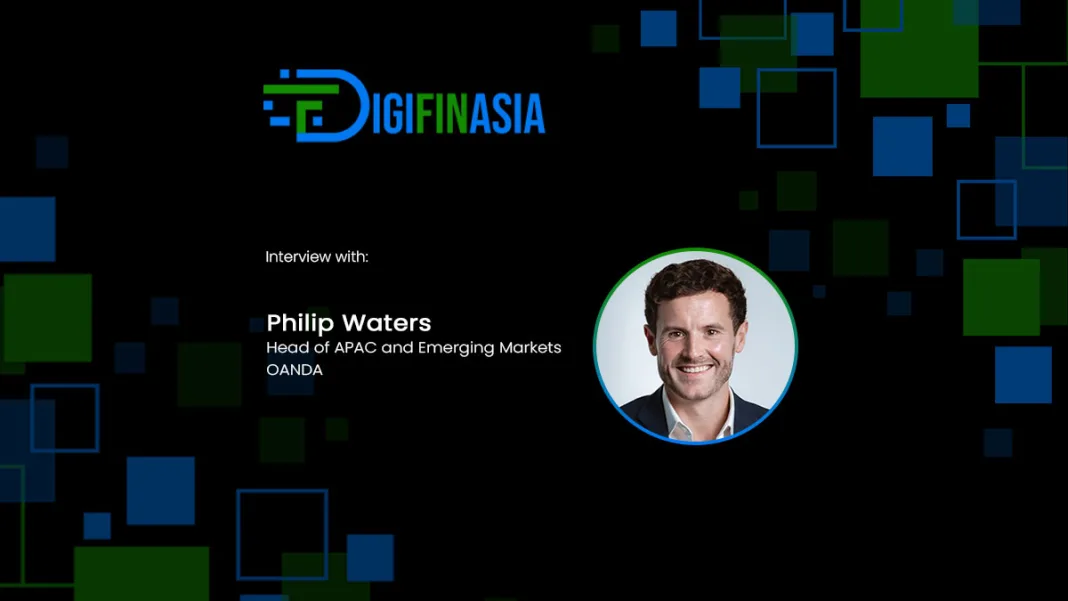Honing the digital finance skills of traders and digitally transforming user experience are the keys for FSI to keep pace with the digital economy
There is no doubt that the financial services sector is transforming at a rapid pace.
As digital technology takes center stage in the financial sector, there is a greater need for finance professionals in the Asia Pacific region to be proficient in digital finance to keep up with the digital economy we operate in today.
What should organizations in the financial services industry do to keep pace with the revolutionary and evolutionary changes taking place, and how does that impact the experience of traders and customers in the financial market?
Philip Waters, Head of APAC and Emerging Markets, OANDA, recently shared his insights with DigiconAsia:
As digital technology takes center stage in the financial sector, there is a greater need for finance professionals to be proficient in digital finance to keep up. What do you think needs to be done to achieve this in Asia Pacific?

Philip Waters (PW): Digitalization and the transformation of user experience are reshaping the entire financial services industry. We see the power of technology leveraged to revolutionize the way retail traders and accredited investors approach trading. It’s clear how digital outputs can enhance client journeys and improve data-based decision making in both retail and institutional finance.
To thrive in our new digital world, finance professionals, investors and traders need new digital skills. These can significantly harness the potential business benefits of AI and automation, predictive analysis, and the ability to anticipate risks and opportunities. To develop these skills, you need three things: education, technological know-how, and a flexible mindset.
First, education is the basis for understanding and navigating today’s increasingly complex and interconnected global financial markets, which could rely heavily on AI and machine learning.
Second, technological expertise and access to big data analysis can influence decision-making and guide actions that create value for the client.
Finally, the willingness to constantly learn and operate in an increasingly disrupted environment is a must to stay relevant and drive results.
Cutting-edge technology can be a double-edged sword when it comes to customer experience. Technology often does not offer the needed human touch. How should technology be employed in improving customer experience?
PW: A key challenge for digital finance is that as the ability to self-serve grows, other areas might be overlooked. But a great digital experience should not come at the expense of hallmark quality, personalised and high-touch customer service. The two are not mutually exclusive. Self-service should be a choice, not a requirement.
At OANDA, we understand that success is personal: the goal is different for every trader, and so is their trading style. The human element should be prioritized along with digital transformation and technology, so a truly brilliant client experience means understanding traders’ pain points and passion points, empowering traders with the right tools, and assisting them with a dedicated relationship manager and 24-hour support.
How can the issue of slow transactions be addressed? Do digital transformation and automation actually help?
PW: Absolutely, both digital transformation and automation are at the core of the development work needed to build a trading platform that is fast and stable.
The quality and speed of order execution are important. In fast moving markets, it’s possible that the price will move as you place your order. The longer the execution time, the more the price is likely to move. Particularly in times of extreme volatility. At OANDA, advanced technology ensures execution times are as short as possible.
For an active trader, being able to rely on a platform that has been engineered for speed, is integral to performance and a great trading experience.
In today’s digital economy, how can the finance industry meet the increasing demand for transparency from traders and customers?
PW: Transparency provides traders with a clear picture of how the broker operates, and it’s fundamental in building trust.
Understandably, fees are the number one thing that traders look at but having fair and accurate pricing is only meaningful if they also have confidence that their broker is fully regulated, and their trades are executed in accordance with best execution requirements.
Also, transparency means better clarity and more informed decision making. Having access to high-grade market information, data and analysis can unlock opportunities and equip traders with what they need to become a successful trader.



